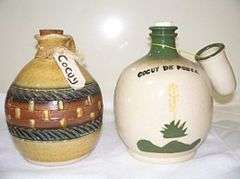Cocuy
The Cocuy Liquor or Cocuy is an alcoholic beverage from the fermented juices of the head, body or leaves of Agave cocui,[1] autochthonous plant from the American tropic, extracted by the artisans in the regions of Falcón and Lara, in Venezuela. Both the plant and their products have been declared by government decree as a cultural and natural heritage of the Falcon State (October 2000), cultural heritage of the Lara State (November 2001)1 and cultural and ancestral heritage of Venezuela (July 2006).
Since 2013, the liquor became popular in Caracas premises serving cocktails based in Cocuy.
The Cocuy liquor is known as the "Tequila of Venezuela"

History
Already in pre-Columbian times, in the semi-arid Central-Western Venezuela, the Cocuy plant was known as life and food for aboriginal tribes Aymanes, Xaguas and Jiraharas. The plant is used as raw material for the drink of the same name.[2] cocuy de penca. The Cocuy Liquor manufactured in the Pecaya Parish, Sucre Municipality of the Falcón State is formally known as "Cocuy Pecayero" by the "Autonomous Service of Intellectual Property (SAPI) in May 2002.
Despite of being a cultural heritage, this activity was classified as unlawful by an unexpected change in the law in 1974, subjecting artisans to persecution. As a consequence 'aguardiente de cocuy' (roughly translated as cocuy spirits) -a combination of neutral alcohol and artisanal cocuy not exceeding 42GL° - was the only form of Cocuy liquor legal to be sold; being strictly supervised by the government. However, in 2005 the law changed, and after being ratified in 2007, Cocuy solely made from Agave was made legal again and many artisanal producers have entered the market competing with the already existing industrial Cocuy Brands (e.g., Cocuy Jirajara, Cocuy Na'guará, Cocuy Lara, et al.)
Finally, the 4th of December 2013, eight artisans were awarded their final permits to produce Cocuy in Pecaya. Today Venezuela has 8 brands and duly authenticated, and is expected that during 2014 the rest of the artisans can get their permits.
Manufacturing
- The Cocuy is made by hand,[3] from the stalk, head or pineapple obtained after removal of the Agave cocui leaves, this is usually baked in artisan ovens at ground level, they coated the walls and bottom with river stones, on which they pile the heads or pads, which are completely covered with leaves removed. The leaves are cooked over low heat with wood. After three to four days in the oven the leaves are removed, and macerated using a wooden bucket and mace. They proceed to manually press to extract the juice, and this is subjected to a process of fermentation and subsequent distillation. (Standard-cocuy Pecayero Covenin 3662).
- The distillation is done today in stills craft consisting of a Saucepan, a rectifier and copper coil; I al alembic emulating introduced during the Spanish colonization. During distillation is obtained a clear drink with a very characteristic aroma and bouquet, with high alcohol degree (50), equivalent to tequila and mezcal produced in Mexico with similar plants.
- The first liquid that is obtained is called head or pringote, with a high alcohol degree it's destined only to the topical use, with therapeutic intentions. The following fluid is called body or heart, owns between 35 and 70 alcoholic degrees. The third party is the tail, that contains between 10 and 35 alcohol degrees and work better for the mixes.
- Also the Cocuy can be aged in barrels of oak, obtaining a liquid that emanates balance and harmony.
References
- ↑ Diaz M. (2003) El Programa Agave: Ciencia y Tecnologia al servicio del hombre de las Zona Aridas. Edic.FUNDACITE Falcon. pp. 37. Caracas.
- ↑ Diaz M y Sanchez R. "001 Del Programa Agave cocui o de como es posible hacer ciencia al servicio del hombre"; Croizatia 2 (3): 167-171.
- ↑ DesdeLaPlaza. "http://www.desdelaplaza.com/urbania/pasos-y-procedimientos-para-realizar-el-licor-de-cocuy/;3